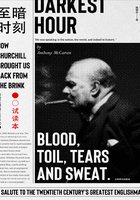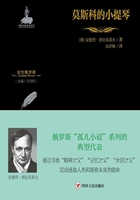The hour being early the landlady herself opened the door.Clare inquired for Teresa d'Urberville or Durbeyfield.
“Mrs.d'Urberville?”
“Yes.”
Tess, then, p assed as a married woman, and he felt glad, even though she had not adopted his name.
“Will you kindly tell her that a relative is anxious to see her?”
“It is rather early.What name shall I give, sir?”
“Angel.”
“Mr.Angel?”
“No; Angel.It is my Christian name.She'll understand.”
“I'll see if she is awake.”
He was sho wn into the front roo m—the din ing-room—and look ed ou t through the spring curtains at the little lawn, and the rhododendrons and other shrubs upon it.Obvious ly her position was by no means so bad as he had feared, and it crossed his mind that s he must somehow have claimed and sold the jewels to attain it.He did not blam e h er for one moment.Soo n his sharpened ear detected footsteps upon the stairs, at which his h eart thumped so painfully that he could hardly stand firm.“Dear me!What will she think of me, so altered as I am!”he said to himself; and the door opened.
Tess appeared on the threshold—not at all as he had expected to see her—bewilderingly otherwise, indeed.Her great natural b eauty was, if not heightened, rendered more obvious by her attire.She was loosely wrapped in a cashmere dr essing-gown of gr ay-white, embroid ered in h alf-mourning tints, and she wore slippers of the same hue.Her neck rose out of a frill of down, and her well-r emembered cable of dar k-brown hair was partially coiled up in a mass at the back of her head and par tly hanging on her shoulder—the evident result of haste.
He had held out his arms, but they had fallen again to his side; f or she had not come forward, remaining still in the opening of the doorway.Mere yellow skeleton that he was now he felt th e contrast between th em, and thought his appearance distasteful to her.
“Tess!”he said huskily, “can you forgive me for going away?Can't you—come to me?How do you get to be—like this?”
“It is too late, ”said she, her voice s ounding hard through th e room, her eyes shining unnaturally.
“I did not think righ tly of y ou—I did not see y ou as you were!”he continued to plead.“I have learnt to since, dearest Tessy mine!”
“Too late, too late!”sh e said, wav ing her hand in the imp atience of a person whose tortures cause every instant to seem an hour.“Don't come close to me, Angel!No—you must not.Keep away.”
“But don't you love m e, m y dear wife, because I have been so pulled down by illness?You are not so fickle—I am come on purpose for you—mymother and father will welcome you now!”
“Yes—O, yes, yes!But I say, I say it is too late.”
She seemed to feel like a fugitive in a dream, who tries to move away, but cannot.“Don't you know all—don't you know it?Yet how do you come here if you do not know?”
“I inquired here and there, and I found the way.”
“I waited and waited for you, ”she went on, her tones sudden ly resuming their old fluty pathos.“But you did not come!And I wrote to you, and you did not come!He kept on saying you would never come any more, and that I was a foolish woman.He was very kind to me, and to mother, and to all of us after father's death.He—”
“I don't understand.”
“He has won me back to him.”
Clare looked at her keenly, then, gath ering her meaning, flagged like on e plague-stricken, and h is glance sank; it fell on h er han ds, w hich, once r osy, were now white and more delicate.
She continued—
“He is upstairs.I hate him now, because he told me a lie—that you would not come again; and you have come!These clothes are what he's put upon me:I didn't care what he did wi'me!But—will you go away, Angel, please, and never come any more?”
They stood fixed, their baf fled hearts looking o ut of their ey es with a joylessness pitiful to see.Both seemed to implore something to shelter them from reality.
“Ah—it is my fault!”said Clare.
But he could not get on.Speech was as inexpressive as silence.But he had a vague consciousness of one thing, though it was not clear to him till later; that his original Tess had spiritually ceased to recognize the body before him as hers—allowing it to dr ift, like a corpse upon the current, in a direction dissociated from its living will.
A few instants passed, and he found that Tess was gone.His face gr ew colder a nd m ore shrunk en as he sto od concen trated on th e moment, an d a minute or two after he found himself in th e street, walk ing along he d id not know whither.
56
Mrs.Brooks, the lady who was the househo lder at The Herons, andowner of all the handsome furniture, was not a person of an unusually curious turn of mind.She was too deeply materialized, poor woman, by her long and enforced bondage to that arithmetical demon Profit-and-Loss, to retain much curiosity fo r its own sake, and apart fro m possib le lodgers'pockets.Nevertheless, the visit of Angel Clare to her well-paying tenants, Mr.and Mrs.d'Urberville, as she deemed them, was sufficiently exceptional in point of time and manner to r einvigorate the feminine proclivity which had been stifled down as useless save in its bearings on the letting trade.
Tess had spoken to her husband from the doorway, without entering the dining-room, and Mrs.Br ooks, who stood with in the partly closed door of her own sitti ng-room at the back of th e passage, c ould hear fr agments of th e conveisation—if conversation it could be called—between those two wr etched souls, She heard Tess re-ascend the stairs to the first floor, and the departure of Clare, and the closing of the front door behind him.Then the door of the room above was shut, and Mrs.Brooks knew that Tess had re-entered her apartment.As the young lady was not fully dressed Mrs.Brooks knew th at she would not emerge again for some time.
She accord ingly ascend ed the stairs softly, and stood at the door of the front room—a drawing-room, connected with the room immediately behind it(which was a bedroom)by folding-doors in the co mmon m anner.This firs t floor, containing Mrs.Brooks's best apartments, had been taken by the week by the d'Urbervil les.The back roo m was no w in sile nce; bu t fro m th e drawing-room there came sounds.
All that she could at f irst dis tinguish of them was one sy llable, con-tinually repeated in a low note of moaning, as if it came from a soul bo und to some Ixionian wheel—
“O—O—O!”
Then a silence, then a heavy sigh, and again—
“O—O—O!”
The landlady looked through the keyhole.Only a small space of the room inside was v isible, but w ithin that space ca me a corner of th e breakfast table, which was already spread for the meal, and also a chair beside.Over the seat of the chair Tess's face was bowed, her posture being a kneeling one in, front of it; her hands were clasped over her head, the skirts of her dressing-gown and the embroidery of her nigh t-gown flow ed upon th e floor beh ind her, an d her stockingless feet, from which the slippers had fallen, protruded upon the carpet.It was from her lips that came the murmur of unspeakable despair.
Then a man's voice from the adjoining bedroom—
“What's the matter?”
She did no t answer, but went on, in a tone wh ich was a soliloquy rather than an exclamation, and a dirge rather than a soliloquy.Mrs.Brooks could only catch a portion:
“And then my dear, dear husband came home to me……and I did not know it……And you had used your cruel persuasion upon me……you did not stop using it—no—you did not stop!My little sisters and brothers and my mother's needs—they were the th ings you moved me by……and you said my husband w ould never come—back—never; and y ou taunted me, and said what a sim pleton Iwas to expect him……And at last I believed you and gave way……And then he came back!Now he is gone.Gone a second time, and I have lost him now for ever……and he will not lo ve me the littlest bit ever any morse—only hate me……O yes, I h ave lost him now—again b ecause of—you!”In writhing, with her head on the chair, she turned her face towards the door, and Mrs.Brooks could see the pain upon it; and that her lips were bleeding from the clench of her teeth, upon them, and that the long lashes of her closed eyes stuck in wet tags to her cheeks.She continued:“And he is d ying—he looks as if he is dying……And my sin will kill him and not kill me……O, you have torn my life all to pieces……made me be what I prayed you in pity not to make me be again……My own true husband will never, never—O God—I can't bear this!—I cannot!”
There were more and sh arper words fro m the man; then a su dden rustle; she had sprung to her feet.Mrs.Broo ks, thinking that the speaker was co ming to rush out of the door, hastily retreated down the stairs.
She need no t have done so, however, for the door of the sittin groom was not opened.But Mrs.Br ooks felt it u nsafe to watch on th e landing ag ain, and entered her own parlour below.
She could h ear noth ing through th e floor, altho ugh she listen ed intently, and thereupon went to th e kitchen to finish her interrupted breakfast.Co ming up presently to the front room on th e ground flo or she took up som e sewing, waiting for her lodgers to ring that s he might take away the breakfas t, which she meant to do herself, to discover what was the matter if possible.Overhead, as she sat, s he could no w hear the floor-boards slightly creak, as if so me one were walking about, and presently the movement was explained by the rustle of garments against the banisters, the opening and the closing of the front door, and the for m of T ess passing to th e gate on her way into the street.She was fully dressed now in the walking cos tume of a well-to-do young lady in which she had arrived, with the sole addition th at over her hat and black f eathers a veil was drawn.
Mrs.Brooks had not been able to catch any word of farewell, temporary or otherwise, between her tenants at the door above.They might have quarrelled, or Mr.d'Urberville might still be asleep, for he was not an early riser.
She went into the back roo m wh ich was more esp ecially her ow n apartment, and continued her sewing there.The lady lodger did not return, nor did th e gentleman r ing h is bell.Mrs.Brooks pondered on the delay, and on what probable relation th e visitor who had called so early bore to th e couple upstairs.In reflecting she leant back in her chair.
As she did so her ey es glanced casually over the ceiling till they wer e arrested by a spot in the middle of its wh ite surface wh ich she had never noticed there before.It was about the size of a wafer when she first observed it, but it sp eedily grew as lar ge as the palm of her hand, and then she could perceive that it was red.The oblong white c eiling, with th is scarlet blot in the midst, had the appearance of a gigantic ace of hearts.
Mrs.Brooks had strange qualms of misgiving.She got upon th e table, and touched the spot in the ceiling with h er fingers.It was dam p, and she fan cied that it was a blood stain.
Descending fro m the table, she left th e par lour, and w ent upstairs, intending to enter the room overhead, which was the bedchamber at the back of the drawing-room.But, n erveless woman as she had now become, she co uld not bring herself to attem pt the handle.She listened.The d ead silence within was broken only by a regular beat.
Drip, drip, drip.
Mrs.Brooks hasten ed downstairs, opened the front door, and ran into the street.A man she knew, one of the workmen employed at an adjoining villa, was passing by, and she begged him to come in and go upstairs with her; she feared something had happened to one of h er lodgers.The workman assented, and followed her to the landing.
She opened the door of th e drawing-room, and stood back for h im to pass in, en tering herself behind h im.The roo m was em pty; the breakfast—a substantial repast of coffee, eggs, and a cold ham—lay spread upon th e table untouched, as when she had taken it up, excepting that the carving knife was missing.She asked the man to go through the foldingdoors into the adjoining room.
He opened the doors, entered a step or two, and cam e b ack almos t instantly with a rigid face.“My good God, the gentleman in bed is dead!I thinkhe has been hurt with a knife—a lot of blood has run down upon the floor!”
The alarm was soon giv en, and the house which had lately been so qui et resounded w ith the tramp of many footsteps, a s urgeon among the r est.The wound was small, but the point of the blade had touched the heart of the victim, who lay on his back, p ale, fixed, dead, as if he h ad scarcely moved after the infliction of the blow.In a quarter of an hour the news that a gentleman who was a temporary visitor to the town had been stabbed in his bed, spread through every street and villa of the popular watering-place.
57
Meanwhile Angel Clare had walked au tomatically along the way bywhich he had come, and, entering his hotel, sat down over the breakfast, staring at nothingness.He went on eating an d drinking u nconsciously till of a sudden he demanded his bill; having paid which he took his dressing-bag in his hand, the only luggage he had brought with him, and went out.
At the moment of h is departur e a telegram was handed to him—a few words from his mother, stating that they were glad to know his address, and informing him that his brother Cuthbert had proposed to and been accepted by Mercy Chant.
Clare cru mpled up the paper, and followed th e route to the station; reaching it, he found that there would be no train leaving for an hour and more.He sat down to wait, and having waited a quarter of an hour felt that h e could wait there no longer.Broken in heart and numbed, he had nothing, to hurry for; but he wish ed to get o ut of a town which h ad been the scene of su ch an experience, and turned to walk to the first station onward, and let the train pick him up there.
The highway that he followed was open, and at a little distance dipped into a valley, acr oss which it could be s een running f rom edge to edge.He h ad traversed th e greater p art of this depression, an d was climb ing th e wester n acclivity, when, pausing for breath, he unconsciously looked back.Why he did so he cou ld not say, but so mething see med to impel h im to the act.The tape-like surface of the road diminished in his rear as far as he could see, and as he gazed a moving spot intruded on the white vacuity of its perspective.
It was a h uman f igure running.Clare waited, with a dim sense th at somebody was trying to overtake him.
The form descending the incline was a wom an's, yet so entir ely was his mind blinded to the id ea of his wife's following him that even when she ca me nearer he did not recogn ize her und er the totally changed attire in which he now beheld her.It was not till sh e was quite close that h e could believe her to be Tess.
“I saw you—turn away from the station—just before I got there—and I have been following you all this way!”
She was so pale, so breathless, so qu ivering in ev ery muscle, that he did not ask her a single question, but seizing her hand, and pulling it within his arm, he led her along.To avoid meeting any possible way farers he left the high road, and took a f ootpath und er some fir-trees.When they were deep am ong the moaning boughs he stopped and looked at her inquiringly.
“Angel, ”she said, as if waiting for this, “do y ou know what I have been running after you for?To tell you that I have killed him!”A pitiful white smile lit her face as she spoke.
“What!”said he, thinking from the strangeness of her manner that she was in some delirium.
“I have done it—I don't know how, ”she continued.“Still, I owed it to you, and to myself, Angel.I feared long ago, when I struck him on the mouth with my glove, that I might do it so me day for the tr ap he set for me in my ****** youth, and h is wrong to you through me.He has come between us and ruined us, and now he can never do it any more.I nev er loved him at all, Angel, as I loved you.You know it, don't you?You believe it?You didn't co me back to me, and I w as oblig ed to go back to him.Why did y ou go away—why did you—when I loved you so?I can't think why you did it.But I don't blame you; only, Angel, will you forgive me my sin against you, now I have killed him?I thought as I ran along that you would be sure to forgive me now I have done that.It c ame to me as a shining light that I sho uld get y ou back th at way.I could not bear the loss of you any longer—you don't know how entirely I was unable to bear y our not loving me!Say you do n ow, dear, dear husban d; say you do, now I have killed him!”
“I do love you, Tess—O, I do—it is all come back!”he said, tightening his arms round her with fervid pressure.“But how do you mean—you have killed him?”
“I mean the I have, ”she murmured in a reverie.
“What, bodily?Is he dead?”
“Yes.He heard me crying about you, and he bitterly taunted me; and called you b y a foul name; and then I did it.My hear t cou ld not bear it.He had nagged me about you before.And then I dressed myself and came away to findyou.”
By degrees he was in clined to believe th at she had faintly attempted, a t least, what she said she had done; and his horror at her impulse was mixed with amazement at the strength of her affection for himself, and at the strangeness of its qua lity, which had apparently extingu ished her moral s ense al together.Unable to realize the gravity of her conduct she seemed at last content; and he looked at h er as she lay upon his shoulder, w eeping with happ iness, and wondered w hat obs cure strain in the d'Urberville b lood had led to this aberration—if it were an aberration.There momentarily flas hed through his mind th at th e fa mily tradition of th e coach and m urder might have ar isen because the d'Urbervilles had been known to do these th ings.As well as his confused and excited id eas could reason, he supposed that in the moment of mad grief of which she s poke her mind had lost its balance, and plunged her into this abyss.
It was very terrible if true; if a temporary hallucination, sad.But, anyhow, here was th is deserted wife of h is, this passionately-fond woman, cling ing to him without a suspicion that he would be anything to finish her but a protector.He saw that for him to be otherwise was nor, in her mind, within the region of the possible.Tenderness was absolutely dominant in Clare at last.He kissed her endlessly with his white lips, and held her hand, and said—
“I will not d esert y ou!I will protect you by every means in my power, dearest love, whatever you may have done or not have done!”
They then walked on under the trees, Tess turning her head every now and then to look at him.Worn and unhandsome as he had beco me, it was plain that she did not discern the least fault in his appearance.To her he was, as of old, all that was p erfection, pers onally an d mentally.He was st ill h er Antino us, her Apollo even; his sickly face was bea utiful as the morning to her affectionate regard on th is day no less than whe n she first b eheld him; for was it no t the face of the one man on earth who had loved her purely, and who had believe d in her as pure.
With an instinct as to p ossibilities h e did no t no w, as he had intended, make for the first s tation beyond the town, but p lunged still f arther under the firs, which h ere abounded for miles.Each clasping the other r ound the waistthey pro menaded o ver the dry b ed of fir-needies, throw n in to a v ague intoxicating atmosphere at the consciousness of being to gether at last, with no living soul between them; ignoring that th ere was a cor pse.Thus they proceeded for several miles till Tess, arousing herself, looked about her, and said, timidly—
“Are we going anywhere in particular?”
“I don't know, dearest.Why?”
“I don't know.”
“Well, we might wa lk a few mil es further, and when it is evening f ind lodgings somewhere or other—in a lonely cottage, perhaps.Can you walk well, Tessy?”
“O yes!I could walk for ever and ever with your arm round me!”
Upon the whole it seemed a good th ing to do.Thereupon th ey quickened their pace, avoiding high roads, and following obscure paths tending more or less northward.But there was an un practical vagueness in their movements throughout the day; neither one of them seemed to consid er any questio n of effectual es cape, d isguise, or long concea lment.The ir e very idea was temporary and unforefending, like the plans of two children.
At mid-day they drew near to a roadside inn, and Tess would have entered it with him to get something to eat, but he persuaded her to remain among the trees and bushes of this half-woodland, half-moorland part of the coun try, till he shou ld come back.Her clothes were of recent fas hion; ev en the ivory-handled parasol that she carried was of a s hape unknown in the retired spot to which they had now wandered; and the cut of such articles would have attracted attention in the settle of a tavern.He soon returned, with food enough for half-a-dozen people and two bottles of wine—enough to last them for a day or more, should any emergeney arise.
They sat d own upon so me dead boughs and shared their meal.Between one and two o'clock they packed up the remainder and went on again.
“I feel strong enough to walk any distance, ”said she.
“I think we may as well steer in a general way towards the interior of the country, where we can h ide for a time, and are less likely to be looked for than anywhere near the coast, ”Clare remarked.“Later on, when they have forgottenus, we can make for some port.”















